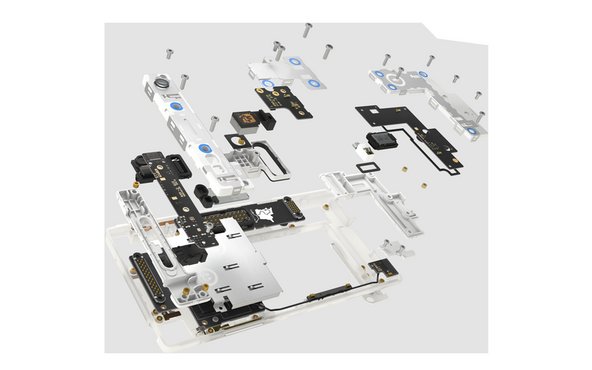Fairphone isn’t your everyday mobile phone maker. While Google has a sprawling campus in Silicon Valley, Fairphone has just the one regular office in Amsterdam. Microsoft boasts a roster of about 100,000 employees; Fairphone has just 36. And while Apple has sold 500 million iPhones, Fairphone has produced and sold just 60,000.
A drop in the bucket—but a significant one. Because the Fairphone project has the potential to change how we make, use, and reuse the phones in our pockets.
Fairphone is building an ethical cell phone: ethically sourced, ethically produced, and now incredibly repairable.
Rule One: Do No Harm
Most of us know that the smartphones in our pockets and the laptops on our desks aren’t doing the environment any favors. Svelte they may be—but gadgets have a surprisingly large environmental footprint. Manufacturing an ordinary mobile phone causes an estimated 35 pounds of carbon dioxide emissions. Add to that a complicated supply chain, a short product lifespan, and low recycling rates—and you’ve got a gadget that is ripe for reinvention.
And that’s exactly what Fairphone set out to do: make a better cell phone, from the ground up. Literally. When they launched in 2010, Fairphone wanted to raise awareness about conflict minerals in consumer electronics. Bloody wars—fueled by the sale of metals essential to modern electronics—have resulted in millions of deaths in the Democratic Republic of Congo.
Tracing the source of materials found in phones—looking for conflict mines or facilities that mistreat workers—is a huge undertaking. Mobile phones contain materials sourced from every corner of the globe. After mining, the materials can pass through dozens of companies—a tangled nest of refiners, middlemen, smelters and wholesalers—before they wind up (in tiny quantities) in your phone. After three years of research and awareness raising, Fairphone decided it was time to turn their ideals into action—to create the most ethical phone possible.
Making a Smarter Smartphone
When the first Fairphone launched to a European market, it contained parts with as few conflict minerals as possible—including conflict-free sources of tin and tantalum from within the DRC. Not yet satisfied, the Dutch company explored yet more ways to reduce the negative impacts of a cell phone. They sent a Fairphone to our teardown engineers, and asked us to write a repair manual for it. While other companies, like Apple, won’t sell repair parts to consumers or independent repair shops, Fairphone made the replacement parts available to everyone through their website. And they offered professional repair services for the less DIY-inclined. Fairphone even sponsors an e-waste program in Ghana that collects cell phones of all sorts to be recycled in Belgium. The goal is to account for the entire lifecycle of the phone, from birth to afterlife.
Backed by an enthusiastic community, Fairphone quickly ran through its first production run of 60,000 phones. And they started crafting Fairphone 2—a phone with a completely original, modular design (the display can be replaced in less than a minute, without any tools).
“The Fairphone 2’s inventive modular architecture gives users more control over their phone, including the ability to easily open and repair the most commonly broken parts,” says Fairphone. The company is also working on making their software as transparent as the hardware by creating an open source ecosystem. And Fairphone is implementing a worker-controlled welfare fund for the factory laborers who put the phones together.
The phone is still only available in Europe. And it will never be as fast as the next Galaxy phone, or sell as feverishly as the next iPhone. But Fairphone is important, because they’re spearheading a new perspective on mobile phones. And their success, even on a small scale, could mean that their ideals aren’t an outlier anymore.
Since Fairphone, similar enterprises have followed—all of them resonating on the same theme: build a better, more sustainable phone. Both Puzzlephone and Phonebloks made waves in the last few years when they proposed modular, upgradeable phones—or a “forever phone,” as Phonebloks called it. Even Google launched its own sustainable, modular phone concept—Project Ara, which is due for a limited release later this year.
Fairphone, though, feels like the first in what could be a watershed movement toward a more holistic approach to phone manufacturing: one that encompasses ethical material sourcing, longer device life spans, and (eventually) easier recycling. And we can’t wait to see what the future holds for the modular Fairphone 2: hopefully, a cameo on our teardown table?
The Fairphone 2 has started accepting pre-orders, which will bring the phone into production. Phones are expected to be delivered in November.
Here’s the spec highlights for Fairphone 2:
- 5-inch, Full HD LCD display
- Android™ 5.1 (Lollipop)
- Qualcomm® Snapdragon™ 801 platform
- 2 GB RAM
- 8 megapixel rear camera
- 32 GB internal storage, expandable via microSD slot
- 2420 mAh removable lithium-ion battery
- 4G LTE/3G/2G
Find out more about Fairphone, and how to order a Fairphone 2 on their website.





2 Kommentare
Mobil raipring
Gfdjc - Antwort
1427235abuze
Gfdjc - Antwort